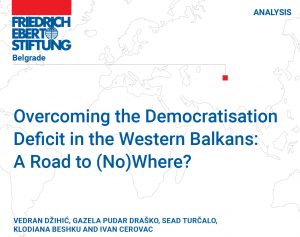16 Aug Overcoming the Democratisation Deficit in the Western Balkans: A Road to (No)Where?
 The internal weaknesses of the process of democratisation in the Western Balkans ensue from reinforcing a system where (ethno)politics and (ethno)political entrepreneurs use all available strategies to deprive citizens of any political agency, thus working towards obedient democracies while keeping real political power within closed circles. The conscious deepening of differences, maintaining negative tensions and instrumentalising – predominantly ethnic – identities for political or other particular purposes are some of the crucial features of (ethno)politics in the Western Balkans.
The internal weaknesses of the process of democratisation in the Western Balkans ensue from reinforcing a system where (ethno)politics and (ethno)political entrepreneurs use all available strategies to deprive citizens of any political agency, thus working towards obedient democracies while keeping real political power within closed circles. The conscious deepening of differences, maintaining negative tensions and instrumentalising – predominantly ethnic – identities for political or other particular purposes are some of the crucial features of (ethno)politics in the Western Balkans.
The promise of Europeanisation is losing its ability to mobilise citizens as it faces a two-fold challenge:
- No Push – while it is clear that progress in the accession process
is extremely slow, even those steps which have been completed with success
are left without meaningful recognition that could revive the ambition to join the EU; - No Pull – The support of political leaders displaying all the characteristics of illiberal
and even authoritarian rule is maintained for the sake of stability in the region.
Whole study in English can be found here


